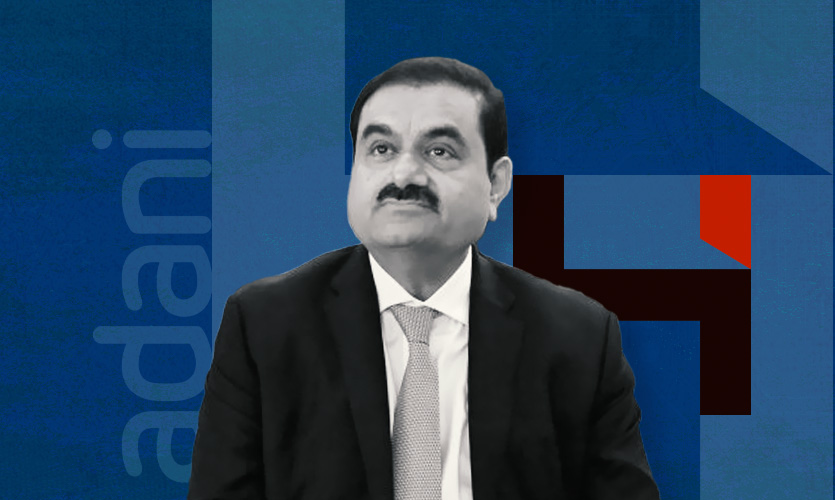In a report published on January 24, Hindenburg Research raised concerns about debt levels and tax haven use by seven listed companies of the Adani conglomerate, controlled by Gautam Adani, one of the wealthiest people in the world.
Hindenburg’s latest report, 106 pages in all, triggered a selloff in Adani Enterprises’ listed firms last Friday, throwing doubt on the success of the company’s record $2.45 billion secondary share sale.
According to the report published by Hindenburg, several offshore funds and shell companies “surreptitiously” own stock in Adani’s listed companies. It questioned how the Adani Group used offshore entities in tax havens in Mauritius and the Caribbean islands. Hindenburg stated on its website that Adani’s responses to the report largely confirmed its findings and ignored its key questions. It reiterated that it had short positions on the Adani Group through US-traded bonds and non-Indian-traded derivatives. The US bonds of Adani firms fell after the report was published.
Despite the lack of evidence, Adani claimed the research report made misrepresentations about its offshore entities. According to Hindenburg, Adani’s lack of direct and transparent answers on the allegations was “telling”. Hindenburg’s report also said that five of the seven key listed Adani companies have reported current ratios, a measure of liquid assets minus near-term liabilities of below 1, which it said suggested “a heightened short-term liquidity risk”.
It further claimed that major listed Adani firms have “substantial debt”, which has put the whole company on a “precarious financial footing”, adding that shares of at least seven of them had an 85 percent downside owing to “sky-high valuations”.
In response to Adani’s announcement, on Thursday, that it is considering taking action against Hindenburg, the research group said that it would welcome such action. As part of its response, Adani stated that its companies had consistently de-leveraged over the past decade, and defended its practice of pledging promoters’ shares to raise financing against claims as collateral. It said that large institutions and banks give loans based on detailed credit assessments, and noted that India has a robust disclosure system in place for the same. Reportedly, the promoter pledge positions in some listed stocks have dropped from more than 50 percent in March 2020, to less than 20 percent in December 2022.
There were more than 350 pages of annexes in Adani’s response, including excerpts of annual reports, public disclosures, and previous court judgments. Adani pointed out that Hindenburg asked 88 questions in its report, 65 of which related to information disclosed by Adani portfolio companies. The rest, as the group claimed in its 413-page riposte on Sunday, pertain to public shareholders and third parties, and some were “baseless charges based on artificial fact patterns”.
“Adani failed to specifically address 62 of our 88 inquiries,” Hindenburg claimed. Hindenburg went on to say that Adani’s response is just about 30 pages long and focuses on problems relating to their study. In addition, on Monday, Hindenburg Research stated that fraud cannot be masked by nationalism or a bloated response that ignores every key allegation it originally raised.
According to the research company, its investigation discovered various anomalies and connections between suspected offshore stock parking entities and Adani Promoters, and crucial questions regarding whether promoter holdings were fully disclosed. Adani’s response, according to Hindenburg, stated that it simply does not know who its significant public shareholders are.
In its response, Hindenburg also mentioned Gudami International, which is controlled by Chang Chung Ling, who is accused of being involved in the AgustaWestland bribery case. Hindenburg says that Ling’s son, Lingo Chang, is the beneficial owner of PMC Projects, one of the Adani Group’s key contractors.
Addressing Hindenburg’s concerns about the company’s auditors, Adani Group stated, “All of these auditors who have been employed by us have been fully certified and qualified by the appropriate governmental agencies.”
Its answer came only hours before the Indian stock exchange opened today, when the $2.5 billion secondary share sale began its second day of subscription. Adani Enterprises’ shares fell below the issue price on Friday, heightening questions about the company’s success.
Adani Group’s chief financial officer Jugeshinder Singh said in a separate statement, on Sunday, that the company is focused on the share sale and is optimistic it will be successful. He also stated that its anchor investors have demonstrated trust and continue to invest. Singh is also certain that the FPO would stick to its present price and deadlines.
However, except for Adani Ports and Adani Enterprises, which are maintaining gains despite dramatic swings, the majority of Adani Group firms are extending Friday’s losses.
The Hindenburg report and its fallout, is seen as one of the biggest career challenges to the billionaire, whose business interests range across ports, airports, mining, energy, media and cement. The magnitude of the harm caused by the report’s discoveries is significant in India, where numerous public sector institutions and the country’s trust fund Life Insurance Corporation (LIC) own significant holdings in the corporation. If Adani crashes as a result of Hindenburg’s claims, countless taxpayers will suffer extremely great losses.









